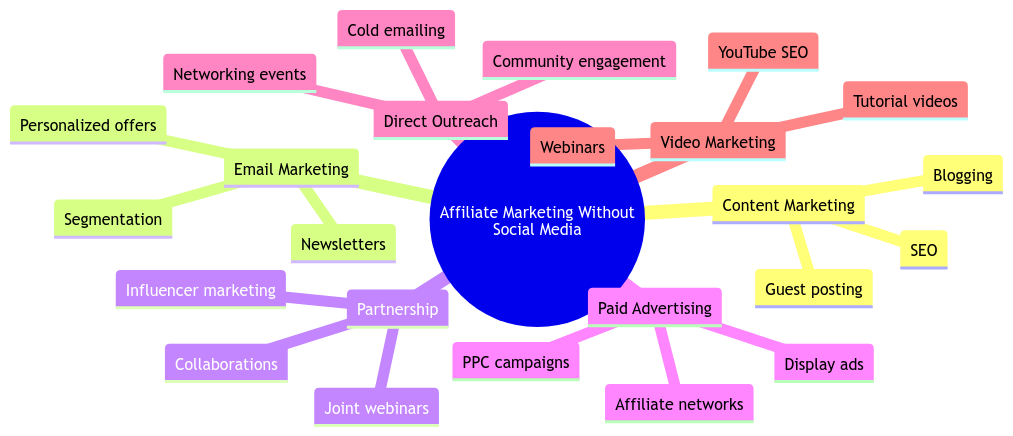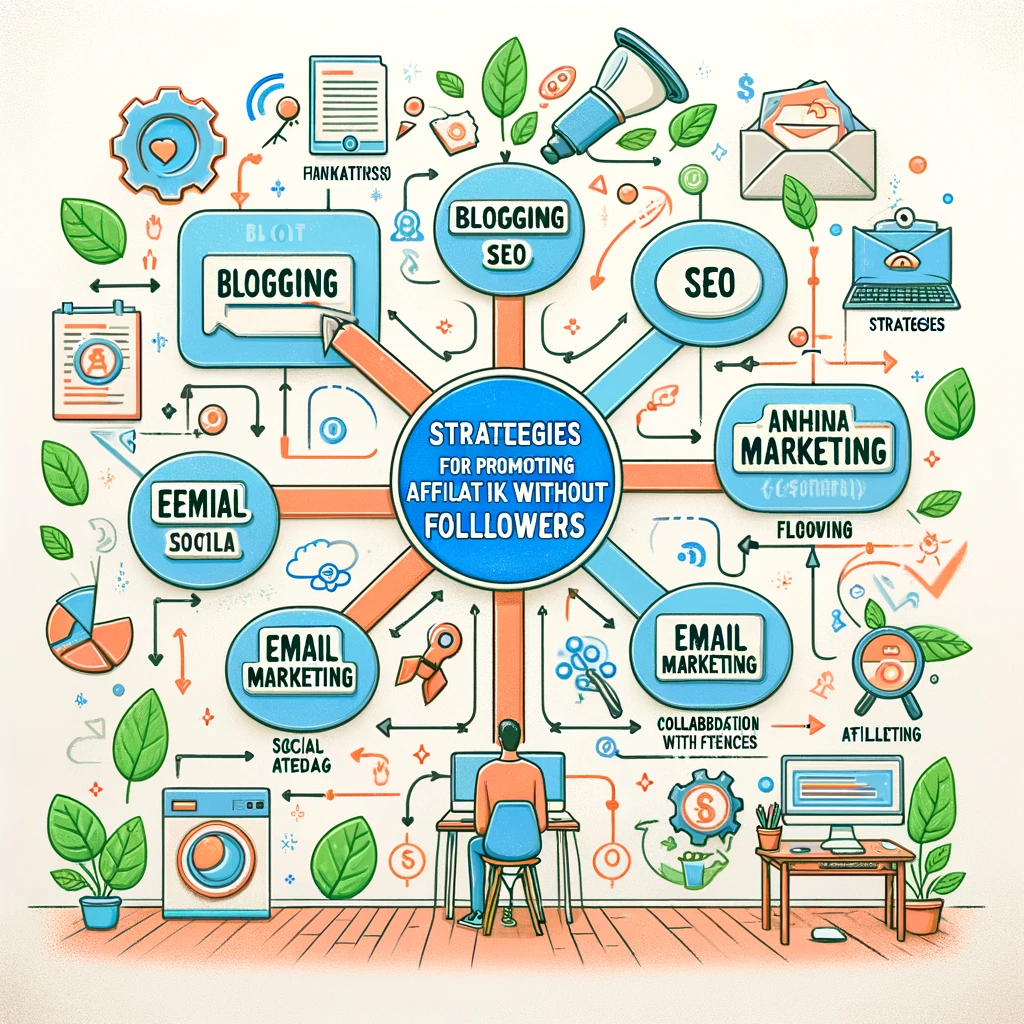As we step into the dynamic world of 2024, the landscape of digital marketing continues to evolve, presenting new frontiers and challenges. Among these, the concept of “affiliate marketing without followers” emerges as a revolutionary paradigm, especially for those embarking on a digital marketing journey without the backing of a large social media following.
Definition and Relevance in 2024
Imagine stepping into a bustling digital marketplace, a world teeming with potential yet daunting in its complexity. Here, the affiliate marketing industry, already a giant valued at over $17 billion, continues to expand, with predictions suggesting a growth to $27.78 billion by 2027. This growth trajectory mirrors the increasing sophistication and diversification of online marketing strategies.
Explaining the Concept in the Current Context
In my long experience of navigating the digital marketing seas, I’ve witnessed the ebb and flow of countless trends. Yet, the concept of affiliate marketing without a social media following stands out. It’s akin to a skilled artisan thriving in a market dominated by industrial giants – a testament to the power of skill and strategy over sheer numbers.
Overview of Challenges and Opportunities
The journey of affiliate marketing without a mass following is not without its hurdles. However, it is a path laden with untapped opportunities. Over 80% of digital brands have adopted affiliate programs, signaling a vast sea of possibilities for those ready to dive in without the lifeboat of a substantial online following.
Understanding Affiliate Marketing Without Social Media

Defining Non-Social Media Affiliate Marketing
In the field of digital marketing, “affiliate marketing without social media” is a unique color. It’s the art of driving sales through channels other than the social media behemoths.
We’re talking about the power of SEO, email marketing, content blogs, and direct partnerships. It’s a world where quality trumps quantity, where a well-placed blog post or a strategically crafted email can outperform a social media post lost in the endless scroll.
Clarifying How It Differs from Traditional Methods
Traditional affiliate marketing often leans heavily on social media – a stage where followers are the currency. In contrast, affiliate marketing without social media is akin to a guerrilla marketing approach.
It relies on the strength of SEO, the precision of direct email campaigns, and the depth of content-driven affiliate marketing strategies. This approach does not merely whisper amidst the social media clamor; it speaks directly to the audience through more focused channels.
Why Choose Non-Social Media Channels?
The choice of non-social media channels offers a spectrum of benefits. For one, it allows for a more targeted approach, reaching audiences through search engines and direct communication. Moreover, it offers a haven from the ever-changing algorithms of social media platforms.
The efficacy of this approach is underscored by a staggering statistic: affiliate marketing can boost revenue by 30%. This is a clear testament to the power and potential of non-traditional affiliate marketing channels.
Strategies for Promoting Affiliate Links Without Followers
In the realm of digital marketing, the strategy is king. For those forging their path in affiliate marketing without the leverage of a massive social media following, this truth resonates even more deeply. Let’s dive into the direct affiliate marketing tactics that can turn the tide in your favor.

1. Using a Blog or Website
Embarking on the affiliate marketing journey without a social media following, one quickly discovers the power of a well-crafted blog or website. These platforms are more than mere digital real estate; they are stages for storytelling, where each blog post can weave a narrative around a product or a service, engaging the reader far beyond the transient appeal of a social media post.
But, before discussing the strategy, it’s crucial to emphasize the importance of impeccable content. Grammarly, an indispensable tool in my long career, ensures that your blog or website is not just well-written but flawless. It’s a non-negotiable asset for anyone serious about affiliate marketing.
Imagine your blog as a beacon in the vast ocean of the internet. It’s not just a platform; it’s your voice, your brand. With nearly 65% of affiliate marketers driving traffic through blogging, it’s evident that a well-crafted blog can be a powerful tool in your arsenal.
Top Blog Strategies for Affiliate Marketing:
- Niche-focused content creation
- SEO optimization
- Regular posting schedule
- Engaging and informative articles
- Strategic placement of affiliate links
2. Automated Affiliate Marketing Websites
Automation is not just a buzzword; it’s a game-changer. Automated affiliate marketing websites are like having a tireless digital marketer working round the clock. They track, analyze, and optimize your affiliate efforts, giving you the freedom to focus on the creative aspects of your strategy.
Automated affiliate marketing websites represent a fusion of technology and strategy, allowing marketers to efficiently manage and scale their campaigns. These platforms offer a blend of analytics, campaign management, and optimization tools, essential for navigating the affiliate marketing arena without the crutch of social media.
3. Creating a Blog Specifically for Affiliate Marketing
For those diving into affiliate marketing, creating a blog tailored to this purpose is akin to crafting a bespoke suit. It’s about designing a space that fits your niche perfectly, engaging readers with content that resonates and converts. The steps and best practices here are manifold, from understanding your audience to creating content that informs, engages, and gently persuades.
Steps to Create an Affiliate Marketing Blog:
| Step | Description |
|---|---|
| 1. Niche Selection | Choose a specific area of interest |
| 2. Platform Choice | Decide between WordPress, Squarespace, etc. |
| 3. Design | Create a visually appealing layout |
| 4. Content Plan | Develop a strategy for content |
| 5. SEO | Implement on-page and off-page SEO techniques |
| 6. Affiliate Links | Integrate them strategically in content |
4. Paid Traffic Campaigns and Utilizing Paid Social Media Traffic
While the focus is on non-social media strategies, one cannot overlook the strategic use of paid traffic campaigns, including those on social platforms. These campaigns can be a boon for those without a significant following and can be targeted to direct traffic to your affiliate marketing website or blog, offering a precision targeting – reaching the right people at the right time with the right message, in contrast to the scattergun approach of traditional social media marketing.

5. Email Marketing: Building an Email List and Strategies
Email marketing, often overlooked in the social media frenzy, is a potent tool in the affiliate marketer’s arsenal. Building an email list opens a direct line of communication with your audience, allowing for personalized, targeted content that drives conversions. Techniques for growing and leveraging an email list are manifold, each offering a unique pathway to engage and convert.
In my experience, OptinMonster is a gem for email marketing. It’s a tool that transforms your website visitors into subscribers and customers. Harness its power to build and grow your email list – a critical asset in your marketing toolkit.
Effective Email Marketing Strategies:
- Personalized email content
- Regular newsletters
- Exclusive offers for subscribers
- Segmentation of the email list
- A/B testing of email campaigns
6. Collaborating with Influencers
Influencer collaborations can be your secret weapon. Collaborating with social media influencers in a strategy that eschews social media followers can be remarkably effective. These collaborations offer a bridge to audiences in niches aligned with your affiliate products, leveraging the influencers’ credibility and a ready audience to reach in a targeted and strategic manner. Remember, it’s about building relationships, not just transactions.
7. SEO and Organic Traffic Generation
At the heart of non-social media affiliate marketing lies SEO. The art and science of SEO are about ensuring that your content ranks high on search engines, becoming a beacon for those seeking solutions or products you promote. Techniques for improving SEO are constantly evolving, demanding a blend of technical acumen and content finesse.
As a cornerstone of my SEO strategy, SEMrush offers an unparalleled suite of tools for keyword research, competitor analysis, and site audits. It’s instrumental in driving organic traffic to your affiliate sites. You can get a Semrush Free Trial Here…
8. Starting an Automated YouTube Channel
An automated YouTube channel represents a convergence of content and technology. Here, YouTube, the world’s second-largest search engine, is an untapped reservoir of potential for affiliate marketers.
An automated channel can serve as a continuous source of engaging and informative content, attracting viewers and directing them to your affiliate products. The steps and tips for creating effective video content for affiliate marketing are intricate, blending creativity with strategic marketing.
9. Implementing Paid Ads
Finally, implementing paid ads, be it on search engines or selective social media platforms, offers a way to amplify your reach for instant visibility and traffic. These ads, when finely tuned and strategically placed, can drive significant traffic to your affiliate marketing channels, complementing your broader non-social media strategies.
The key lies in crafting compelling ad copy and targeting the right audience to ensure your investment reaps rich dividends.
Tools and Platforms for Effective Affiliate Marketing
In the chess game of affiliate marketing, tools and platforms are your knights and bishops. Over the years, I’ve come to realize that choosing the right tool is half the battle won.

1. ClickFunnels 2.0
First in our arsenal is ClickFunnels 2.0, a versatile platform that’s akin to having a Swiss Army knife in your toolkit. It’s not just about creating sales funnels; it’s about crafting a journey for your potential customers, one that guides them seamlessly from awareness to purchase.
2. Lead Generation Software for Various Industries
Diverse industries require diverse strategies. Lead generation software is crucial in this aspect. Each industry has its quirks, and tailoring your approach with the right tool can significantly uplift your conversion rates.
3. CRM Software Recommendations
In my two decades in digital marketing, I’ve seen CRM software evolve from simple contact management systems to complex, AI-driven platforms. A robust CRM system is like the backbone of your affiliate marketing efforts, keeping your strategies aligned and focused.
Top CRM Software Features:
- Contact and lead management
- Sales forecasting
- Marketing automation integration
- Analytics and reporting
- Mobile accessibility
4. Page Builder Comparisons (Instapage vs Unbounce)
Let’s talk about page builders – Instapage and Unbounce. They’re not just tools; they’re canvases for your creativity. Whether it’s Instapage with its intuitive design capabilities or Unbounce with its robust A/B testing features, choosing the right page builder can significantly influence your campaign’s success.
5. Infusionsoft (Keap) Pricing and Features
Infusionsoft (now Keap) brings a unique blend of marketing automation, sales automation, and CRM functionality. It’s a tool that grows with you, adapting to your evolving marketing needs. Understanding its pricing and features is vital to maximizing its utility in your affiliate marketing toolkit.
Alternative Platforms and Methods for Affiliate Marketing
Diving deeper into the world of affiliate marketing, one discovers a rich tapestry of alternative platforms and methods. Each offers unique opportunities to reach your audience in ways that social media simply cannot.
Exploring Affiliate Networks Opportunities and Direct Partnerships
In the universe of affiliate marketing, networks and direct partnerships are like constellations – each with its unique configuration and allure. Exploring these networks involves understanding their unique advantages and aligning them with your marketing goals.
Content Marketing: Blogs, eBooks, Webinars
Content marketing in affiliate sales is not just about filling pages; it’s about filling minds. Through blogs, eBooks, and webinars, you can establish authority and build trust, crucial elements in affiliate marketing. It’s a strategy that goes beyond selling to educating and engaging.
Real-world Examples and Case Studies
To illustrate the effectiveness of these alternative platforms, let’s look at real-world examples. Case studies of successful affiliate marketers who have leveraged these platforms can provide valuable insights and practical strategies.
Advantages and Disadvantages of Affiliate Marketing Without Social Media
we’ll explore the dual sides of affiliate marketing without social media, balancing the scales of advantages and disadvantages.

1. Evergreen Content and Objective Metrics
One of the most significant advantages is the creation of evergreen content. Unlike social media posts that fade quickly, blog posts or articles remain relevant, continuously driving traffic. This approach offers objective metrics for performance evaluation, unlike the often ambiguous metrics of social media.
2. High Costs and Limited Reach
However, there are challenges. The absence of social media’s broad reach means potentially higher costs in reaching the same audience through other channels. It’s a game of precision versus volume.
3. Lack of Engagement vs Higher Conversions
Lastly, while you may miss out on the immediate engagement that social media provides, this approach often leads to higher conversion rates. It’s a trade-off between the breadth of engagement and the depth of connection.
Pros and Cons of Non-Social Media Affiliate Marketing:
- Pros:
- Higher conversion rates
- Sustainable, long-term traffic
- More targeted audience approach
- Cons:
- Higher initial costs
- Requires more strategic planning
- Slower audience growth
In summary, affiliate advertising without social media isn’t a path devoid of hurdles, but it’s one where strategic planning, quality content, and targeted approaches pay off significantly in the long run.
Key Considerations, FAQs, and Unique Ideas
Necessity of Social Media in Affiliate Marketing
In my experience, one question often surfaces: “Is social media necessary for affiliate marketing?” The short answer is no. While social media can be a powerful tool, its absence is not a deal-breaker. This is where strategic planning and alternative affiliate marketing platforms come into play, offering a multitude of paths to success. A statistic underscoring this is that affiliate marketing accounts for 15-30% of all eCommerce sales, indicating substantial success through channels other than social media.
Audience Requirements for Affiliate Marketing
Understanding your target audience’s needs is crucial, regardless of the platform used. It’s about quality over quantity. Knowing your audience’s needs and preferences allows you to tailor your content and strategies effectively, ensuring higher engagement and conversion rates.
Building a Personal Brand without Social Media
Building a personal brand without social media is like crafting a fine novel. It requires consistent, high-quality content and establishing yourself as an authority in your niche. Your brand is your story – make it compelling.
For quality content, Grammarly ensures your communication is clear, effective, and professional, a vital tool in establishing your brand identity.
Affiliate Marketing for Specific Audiences
Tailoring your strategies for specific demographics can significantly enhance your affiliate marketing efforts. Whether it’s stay-at-home parents, fitness enthusiasts, or tech aficionados, understanding and catering to the unique interests of these groups can yield impressive results.
For that, we recommend Semrush tool, that provide valuable insights into audience preferences and behaviors, guiding content and strategy development.
Creative Content Strategies (YouTube, Blogs, eBooks)
Diversifying your content strategy is crucial. From engaging YouTube videos and informative blogs to comprehensive eBooks, each content type offers a unique way to engage and educate your audience.
Utilizing Search Engines and Keyword Research
Search engines are your best friends in affiliate marketing. Effective keyword research and SEO practices ensure your content reaches the right audience, driving organic traffic and boosting visibility. Semrush, with its comprehensive suite of SEO tools, is instrumental for optimizing content and improving search engine visibility.
Exploring Non-traditional Media for Affiliate Marketing
The digital world is vast, and so are the opportunities for affiliate marketing. Exploring non-traditional media like podcasts, webinars, or even virtual events can open new doors for affiliate marketers looking to stand out.
FAQ About Non-Social Media Affiliate Marketing:
- How do I choose the right affiliate products without social media insights?
- Focus on products that align with your content and audience’s interests.
- Can I succeed in affiliate marketing without a large following?
- Absolutely. It’s about targeting the right audience, not just the size.
- What are the best strategies for affiliate marketing without social media?
- SEO, email marketing, content marketing, and direct partnerships are highly effective.
Setting Up for Success in Affiliate Marketing
1. Choosing the Right Products and Niches
In the vast sea of affiliate marketing, selecting the right product is like finding a treasure chest on a deserted island. It’s not just about the product’s appeal; it’s about its relevance to your audience and your niche. A profound understanding of market trends, made possible through tools like SEMrush, is crucial in this endeavor. Read This Semrush Review for more details…
2. Content Creation Strategies
Creating content that resonates with your audience is an art form. It’s about blending valuable information with engaging narratives. Utilizing Grammarly ensures that your content is not just informative but also grammatically flawless and compelling.
3. Understanding and Engaging the Target Audience
Understanding your audience goes beyond demographics. It’s about delving into their interests, challenges, and behaviors. This understanding is key to creating content that not only attracts but also retains their attention.
4. Utilizing Referrals, Messages, and Calls
In affiliate marketing, personalization is key. Utilizing referrals, personalized messages, and direct calls to action can significantly enhance audience engagement and conversion rates.
Towards successful affiliate marketing, remember, the right combination of tools, strategies, and an in-depth understanding of your audience can set the foundation for a successful with affiliate marketing without social followers venture.
Addressing Common Concerns in Affiliate Marketing
Navigating the waters of affiliate marketing often raises a series of common concerns, each requiring careful consideration and strategic responses.
1. Disclosure Requirements for Affiliate Links
Transparency is paramount. The requirement to disclose affiliate links is not just a legal obligation but also a trust-building element with your audience. It’s about maintaining integrity while promoting products.
2. Anonymous Affiliate Marketing
The concept of anonymous affiliate marketing often surfaces. While maintaining privacy is feasible, building trust and credibility typically requires some level of transparency.
3. Rules and Ethics of Affiliate Marketing
Adhering to ethical practices in affiliate marketing is crucial. This includes honest reviews, accurate representations of products, and adherence to legal requirements.
Common Ethical Considerations in Affiliate Marketing:
- Honest representation of products
- Clear disclosure of affiliate relationships
- Avoidance of misleading claims
- Respect for consumer privacy and data protection
In addressing these concerns, affiliate marketers not only ensure compliance with regulations but also build a foundation of trust with their audience, which is crucial for long-term success.
Monitoring and Adjusting Strategies
In the landscape of affiliate marketing, constant monitoring and strategic adjustments are key to staying ahead.
1. Utilizing SEO to Boost Visibility
SEO is not a one-time setup; it’s an ongoing process. Regularly updating your strategies based on current trends and algorithm changes is essential. Tools like SEMrush offer invaluable insights for tweaking your SEO tactics for optimal performance.
2. Email Marketing Approaches
With email marketing, it’s about refinement. Analyzing open rates, click-through rates, and conversions can guide you in fine-tuning your email campaigns for better engagement and effectiveness.
3. Analyzing Results and Making Adjustments
The heart of affiliate marketing lies in its ability to adapt. Using analytics tools to monitor your campaigns provides data-driven insights. This, combined with an agile approach to strategy modification, can significantly elevate your affiliate marketing performance.
Conclusion
Reflecting on our journey through the intricacies of affiliate marketing without social media, we uncover a landscape rich with potential and growth. The industry, already formidable at over $17 billion, is projected to expand to a staggering $27.78 billion by 2027, illustrating the vast opportunities that lie ahead.
This exploration underscores the efficacy of targeted strategies, quality content, and utilizing the right tools, such as Grammarly for exceptional content creation and SEMrush for insightful SEO and market analysis. The future of affiliate marketing, with its projected growth and evolving strategies, promises a landscape teeming with opportunities for innovation and success.
As digital marketing continues to evolve, so too will the strategies and platforms for effective affiliate marketing, offering a myriad of opportunities for those willing to explore and adapt.

Affiliate Marketing Without Social Media Related FAQ
Q. What is Affiliate Marketing?
A: Affiliate marketing is a commission-based online business model where you generate sales for online stores and earn commissions through your unique affiliate link. It involves promoting products or services on platforms such as websites, blogs, or even through email marketing.
Q. Can Affiliate Marketing Make Me Rich?
A: Yes, affiliate marketing has the potential to be highly lucrative. Approximately 3% of affiliate marketers make over $150,000 per year. With the right products, reliable traffic sources, and consistent effort, achieving significant financial success is possible.
Q. How Much is the Global Affiliate Industry Worth?
A: The global annual investment in the affiliate industry exceeds $16 billion, indicating its vast scope and potential for profitability.
Q. How Do Affiliate Networks Make Money?
A: Affiliate networks generate revenue through fees charged to advertisers for using their network of publishers and data tracking capabilities. These fees are often structured as a percentage of each sale made.
Q. What’s the Difference Between Affiliate Marketing and Drop-Shipping?
A: In affiliate marketing, the publisher recommends products and earns a commission for sales made through their affiliate link. They don’t handle the sales process or customer support. Drop-shipping involves running an online store without holding inventory, where the drop-shipper handles the sales process but not the stock.
Q. Can Affiliate Marketing Be Used for Lead Generation?
A: Yes, affiliate marketing can be effectively used for lead generation, especially for companies offering services rather than products. It can create leads that are part of a broader sales funnel.
Q. Are Affiliate Marketing and Performance Marketing the Same Thing?
A: Affiliate marketing is a type of performance marketing. The commission in affiliate marketing is typically based on performance, such as making a sale or generating a lead.
Q. Can You Promote Affiliate Offers on Mobile Devices?
A: Promoting affiliate offers on mobile devices is not only possible but increasingly important. Mobile devices offer unique tools and apps for marketing, and with a significant portion of internet traffic coming from mobile, it’s a vital channel for affiliate marketing.
Q. What Are Some Effective Ways to Do Affiliate Marketing Without Social Media?
A: There are many effective methods to master affiliate marketing without relying on social media. These include creating a blog or website, utilizing email marketing, leveraging SEO, and participating in online forums and communities.
Q. How Important Are Content Marketing and SEO in Affiliate Marketing?
A: Content marketing and SEO play critical roles in affiliate marketing. Content marketing costs 62% less than traditional marketing and generates about three times as many leads. Additionally, 92% of marketers believe content creation is effective for SEO, which is crucial for driving organic traffic.
Q: How can I get started with affiliate marketing without a social media following?
A: You can start affiliate marketing without a social media following by focusing on other avenues like blogging, crafting an affiliate website, engaging in SEO practices, or running email marketing campaigns. Social media is just one way to promote your affiliate links. It’s also beneficial to join various affiliate programs related to your niche.
Q: What are the benefits of affiliate marketing without followers on social media?
A: Affiliate marketing without social media followers can bring benefits such as less reliance on a single platform, thus reducing risk. It allows you to broaden your horizons and leverage other effective platforms like personal websites, blogs, SEO, and email marketing, which can work well for promoting your affiliate marketing business.
Q: Can I be successful with affiliate marketing without using social media?
A: Yes, absolutely. While social media can be a great tool for affiliate marketing, it’s not the only option. Many affiliate marketers have found success through SEO practices, email marketing, PPC advertising, and content marketing. Success in affiliate marketing depends more on the quality and relevance of your promotions rather than the platforms you use.
Q: How does affiliate marketing work without the use of social media?
A: Affiliate marketing works without social media by using other online strategies to promote your affiliate links. This may include creating an affiliate website, launching email marketing campaigns, or using SEO tactics to organically attract visitors who may click on your affiliate links. You ultimately earn affiliate commissions whenever someone makes a purchase through your links.
Q: What are the best ways to be successful with affiliate marketing without a social media following?
A: The best ways to be successful with affiliate marketing without a social media following can include creating an SEO-optimized affiliate website, blogging about your affiliate products, running email marketing campaigns targeting a specific audience, and joining high-converting affiliate programs. Additionally, understanding your audience’s needs and providing valuable and relevant content is crucial for success.
Q: Can I start an affiliate marketing campaign without a website or social media?
A: Yes, you can start an affiliate marketing campaign without a website or social media. Some alternative methods include using a landing page builder, article marketing, forum posting, or email marketing. While having a website or social media presence can help, they are not strictly necessary for success in the affiliate marketing business.
Q: Do I need a big social media following to be a successful affiliate marketer?
A: No, it’s not necessary to have a large social media following to be a successful affiliate marketer. While many affiliate marketers use social media for promotion, success also depends on other factors like the quality of the products you’re promoting, the relevance to your audience, and your marketing strategies. You can still be a successful affiliate marketer without a social media following.
Q: How to use affiliate marketing without social media for higher affiliate commissions?
A: To use affiliate marketing for higher commissions without social media, focus on methods like SEO to drive free traffic to your affiliate website, email marketing to nurture and convert leads, content marketing to provide value and engage your audience, and testing different affiliate programs to find the most profitable ones in your niche.
Q: What are the major considerations in getting started with affiliate marketing without using social media?
A: When getting started with affiliate marketing without social media, consider the complete understanding of your target audience, choosing the right affiliate program that aligns with your audience’s interests, creating an affiliate marketing campaign, and focusing on growing your email list. Additionally, always prioritize providing value and quality to earn trust and build long-term relations with your audience.

